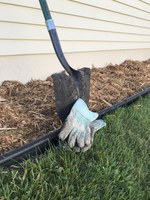Dakota Gardener: The Right Plant
(Click an image below to view a high-resolution image that can be downloaded)
By Carrie Knutson, NDSU Extension Agent, Grand Forks County
I finally can cross an item off of my outside to-do list: I finished redoing the rock and fabric landscaping around my house.
My husband and I ended the project by removing the rock on the west side of the garage to fill in around the house. The plan was to seed the area by the garage with grass. The area is hot and dry. I was not super-excited about growing plants in the conditions.
Once I saw the bare soil, my inner gardener took over and I quickly was running down a list of plants that might work. I wasn’t going to waste my resources selecting plants that prefer moist soil and cooler conditions.
When deciding what plants you would like to include in your landscape, pick the right plant for the environment. Landscapes can have several microclimates. The “Garden-peida” by Pamela Bennett and Maria Zampini defines a microclimate as an area with a little bit different climate from that of the region around it.
Examples would be a warm south side of your house (or west in my case) or a cool north side. Microclimates also can be used to grow plants that need a little more protection.
When assessing microclimates, look at the area you want to plant and take an inventory of the conditions. Sun exposure, shade from existing structures or trees, low or high spots and soil types are all items to take into consideration.
Then do your research on plants that will do well in those conditions. Don’t be swayed by pretty blooms if the plant doesn’t fit the site’s microclimate.
The first plants on my list to research were native plants that like hot and dry conditions. Native plants are adapted to our soil and climate and are usually easier to grow than non-native plants. Once established, they also need less care than non-natives.
Here are some plants that should grow well in my hot and dry microclimate:
- Purple coneflower, Echinacea angustifolia, a coarse-textured plant that has pink-purple blooms with a spiny center cone - The plant prefers full sun and is drought tolerant.
- Blanket flower, Gaillardia aristata, a soft-textured plant with sprawling stems of yellow-rimmed flowers with red centers - The plant prefers full sun, is drought tolerant and can re-seed.
- Black-eyed Susan, Rudbeckia hirta, a course-textured plant that has golden yellow flowers - The plant isn’t bothered by hot, dry summers and freely reseeds.
- Blue grama, Bouteloua gracilis, a bunch grass with slender stalks and eyebrow-shaped seed heads - The grass grows well in any soil type and has excellent drought tolerance.
- Little bluestem, Schizachyrium scoparium, a grass with fuzzy white seed heads - The grass is drought resistant once established. The grass grows best in full sun and poor soil, but will grow in clay soils.
Now that I have some plant options, it is time to get my colored pencils out and start designing. Happy gardening!
For more information about gardening, contact your local NDSU Extension agent. Find the Extension office for your county at https://www.ag.ndsu.edu/extension/directory/counties.
NDSU Agriculture Communication - Aug. 11, 2020
| Source: | Carrie Knutson, 701-780-8229, carrie.knutson@ndsu.edu |
|---|---|
| Editor: | Ellen Crawford, 701-231-5391, ellen.crawford@ndsu.edu |




